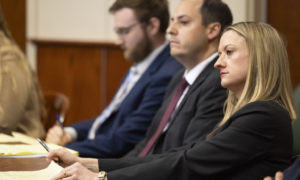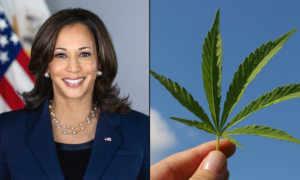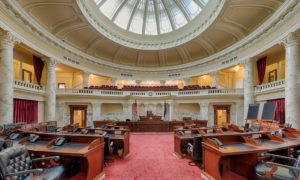Some of Indiana’s most influential lobbyists and political operatives joined a secretive investment company that several partners say has worked for years to cash in on the potential legalization of marijuana in Indiana.
The company, Hoosier Emerging Technologies, was created in late 2012 and is registered to Jim Purucker, one of the state’s most prominent alcohol and gaming lobbyists. Two investors in the company told IndyStar the primary aim was to influence legislation that would enable it to secure a place in the lucrative marijuana market.
The people Purucker recruited to invest in the company are a veritable who’s-who of top Indiana powerbrokers — Democrats and Republicans — an IndyStar investigation has found.
Among them: Former Indiana House speakers, former state campaign chairmen for Barack Obama and Donald Trump, high-powered lobbyists and some of the state’s most prolific political fundraisers. However, not all of them said they were aware of the company’s marijuana ambitions.
It does not appear the company and its investors broke any laws. Still, government accountability advocates worry that such a secretive alliance of insiders with undisclosed financial interests in legislation could undermine an already cynical public’s faith in state government.
“It’s everything you don’t want in government,” said Zachary Baiel, president of the Indiana Coalition for Open Government.
He and other government watchdogs said the situation reinforces their calls for more transparency and disclosure in state government.
Legislative leaders also expressed concerns.
“It bothers me a great deal,” Senate leader David Long, R-Fort Wayne, said in response to IndyStar’s findings. “It would appear that there were people trying to surreptitiously insert language to help create a monopoly. … It bothers me that people might be trying to manipulate the law for their own financial benefit.”
Purucker declined to comment for this story.
Three investors and another source familiar with the company told IndyStar that Purucker’s pitch was simple: Buy at least a single $1,000 share and you could hit the jackpot if marijuana becomes legal.
Only one of those sources agreed to speak publicly about the company.
“It had to do with an opportunity to make money with this company if marijuana was ever legalized in this state,” said investor Kip Tew, a former Indiana Democratic Party chairman who served as Obama’s campaign chairman in Indiana.
Tew and others said details about how the company would make money under such a scenario were vague.
“What was told to me was that the entity I invested in was going to invest in another entity that was going to provide some service to the distributors or retailers like in other states where it was legalized,” Tew said.
Three other investors told IndyStar they were unaware of the company’s marijuana ambitions.
The company was such a closely held secret that leaders of the General Assembly said they were unaware of its existence, even as some with an interest in the company advocated for language that found its way into bills and, in some cases, into law.
That legislation included the state’s controversial vaping law that took effect last year. It effectively made a single Indiana security company, Lafayette-based Mulhaupt’s Inc., the sole gatekeeper of the vaping industry. The regulatory framework established in the vaping law could eventually be used if marijuana was legalized in Indiana, according to two investors who requested anonymity
Tew and other investors said they did not know if Hoosier Emerging Technologies’ intent was to invest in Mulhaupt’s.
Mulhaupt’s owner Doug Mulhaupt did not return multiple messages left at his office, with his lobbyist and with a PR firm the company hired.
It is unclear exactly how many investors Purucker recruited, though several investors said there may have been dozens, including members from most large lobbying firms in Indianapolis.
The involvement of so many Statehouse influencers made it difficult for some opponents of the vaping legislation to find representation at the Statehouse, said Evan McMahon, whose group Hoosier Vapers fought against the legislation, but was unaware of Hoosier Emerging Technologies until recently.
“In 2015, when this first came up, we tried to find a lobbyist to represent our industry and every single person we talked to said they had a conflict,” he said.
At that time, McMahon said, he did not know there was what he described as “a shadow cabal working together for years.”
Dealing among friends
While some investors told IndyStar that HET’s focus was marijuana, another said vaping was key to the company’s plans.
“What I thought they were doing, as far as I know, is try to get a lock on the vapor thing,” said investor Rex Early, a former Indiana Republican Party Chairman who served as Trump’s campaign chairman in Indiana.
He said he bought a $1,000 share of the company, but emphasized that he didn’t know about any marijuana connection.
“I never heard that,” he said. “I’m not a big marijuana guy. Do not put me in there as promoting marijuana.”
Former Indiana House Speaker Mike Phillips, now a lobbyist, acknowledged he and his son also put money into the company, but he also said marijuana was never discussed with him.
“We were of the mind it had to do with the high-tech development of the systems used in racetracks,” he said recently while sitting on a bench outside House Speaker Brian Bosma’s office.
Paul Mannweiler, another former House Speaker-turned-lobbyist who advocated for the vaping law, said neither vaping nor marijuana were discussed when he decided to put money into the company.
“I guess it could have included buying the USA TODAY, I don’t know,” he said, referring to the national news outlet owned by IndyStar’s parent company.
When asked how HET’s prospectus described the investment, he said he was “dealing among friends” and didn’t “remember reading anything.”
“I think Jim just said he was getting a group together,” he said. “I’ve worked with Jim on a number of issues. He’s a friend that I know to be a good person.”
Harmful side effects?
Two sources familiar with the company say many of its concepts were discussed informally over drinks at the Winner’s Circle, an off-track betting parlor in Downtown Indianapolis and a frequent hangout for lobbyists and lawmakers.
Purucker and his longtime client Rod Ratcliff were always at the center of the discussions, which typically took place in the betting parlor’s private Triple Crown Club, the sources said. Ratcliff is the chief executive of Centaur Gaming, which owns the Winner’s Circle and Indiana’s two horse track-casinos in Anderson and Shelbyville.
The off-track betting facility was an appropriate place to plan what was essentially a long shot gamble on marijuana legalization in staunchly conservative Indiana. Long and Bosma have consistently opposed legalizing even medical marijuana.
Some people with a stake in the company made several unsuccessful legislative attempts to create a license to distribute marijuana in 2013 and 2014. After that, Purucker and several other lobbyists with ties to Ratcliff and his Centaur Gaming company launched a massive lobbying effort in favor of the 2015 and 2016 vaping legislation.
Ratcliff did not return several messages from IndyStar. But a Centaur spokeswoman sent IndyStar a statement: “Neither Centaur Holdings, LLC, nor any of its subsidiaries or affiliates, has an affiliation with the vaping industry. Centaur has neither sole nor partial ownership of any licensees or entity related to the manufacture, distribution or security of vaping products. Our sole focus remains to provide our guests with the best value in gaming, racing, dining and entertainment.”
None of the high-powered lobbyists pushing for the vaping law — Purucker, Mannweiler, Brian Burdick and Kenneth Cragen — listed Hoosier Emerging Technologies as a client or employer. They listed their efforts under Indiana Vapor Company. Burdick did not return messages from IndyStar. Cragen declined to discuss his role.
Their efforts culminated in the vaping law that took effect last year and gave Mulhaupt’s sole discretion over who could seek a license to manufacture e-liquid.
Mulhaupt’s chose to work with only six companies, many with past ties to Centaur or current ties to the liquor industry.
As a result, prices skyrocketed and scores of vapor shops and manufacturers were forced to close or leave the state. The unusual nature of the law also drew attention from the FBI, which opened an investigation to determine if there was any wrongdoing.
The FBI has not commented on the status of the investigation or its targets.
IndyStar reported last month that the vaping law shared a common feature with draft legislation from 2013 that would have legalized medical marijuana. Both included security firm requirements that gave Mulhaupt’s a distinct advantage.
“It’s everything we always had a gut feeling about,” said Amy Lane, whose Indiana Smoke Free Alliance represents many small vapor shops and manufacturers that lost business because of the legislation. “This wasn’t for public health and safety. It was about lining somebody’s pockets. It’s disgusting, really. It’s disgusting that people are allowed to behave this way at the expense of small businesses.”
She said 60 vapor retail locations and 46 manufacturers have closed since the vaping law went into effect last summer. Wholesale prices for e-liquid have shot up 45 percent, she said.
A matter of disclosure
Lawmakers are now in the midst of overhauling that law. Senate Bill 1 would get rid of the security firm requirements and other portions of the law that a federal court found to be an unconstitutional barrier to interstate trade.
The House and Senate passed slightly different versions of the bill and must work out their differences before the 2017 legislative session ends Friday.
But fixing the vaping law is only the beginning of the work lawmakers need to do if they want to restore public faith in the General Assembly, said Julia Vaughn, policy director for Common Cause Indiana, a government accountability group.
“We are at a point in time when the public is cynical, and things like this confirms their belief that there is a small group of insiders who inflict their will on the General Assembly and usually with a profit motive behind it,” she said. “This is another example of why we need sweeping reform.”
The secretive nature of the company was enabled in part because of what some open government experts say is a gap in Indiana’s ethics rules. Lobbyists in Indiana do not have to disclose which lawmakers they lobby or any of their communications with those lawmakers. In fact, they are only required to list the general topic of their lobbying, not the specific piece of legislation they are trying to influence.
At least 13 other states require lobbyists to disclose more specific information about their activities, according to the Sunlight Foundation, a Washington, D.C.-based nonprofit group that advocates for transparency in government.
Lawmakers had an opportunity earlier this year to make interactions between lobbyists and lawmakers more transparent, but took a pass.
Senate Bill 289, authored by Sen. Mike Delph, R-Carmel, would have required lobbyists to keep a log of all communication with lawmakers, making their emails, texts and social media correspondence a matter of public record. The bill also would have made it illegal for lawmakers to accept gifts from lobbyists.
The measure never got a hearing.
“If the public needed another reason to have access to their legislator’s e-mails, this would be one to add to the ever growing list,” said Baiel, president the Indiana Coalition for Open Government. “Public policy should be made in the light of day and on the record. For posterity. If we cannot reconstruct how bills are made, how can we trust the outcomes of the legislation?”
About Hoosier Emerging Technologies
Hoosier Emerging Technologies was created Dec. 11, 2012, and registered as a limited liability corporation with the Indiana secretary of state’s office.
Company president: Jim Purucker. He is a longtime casino and alcohol lobbyist. He pushed for Indiana’s vaping law. His clients include the Indiana Vapor Co., Wine and Spirit Wholesalers of Indiana, Indiana Towing and Wrecker Association and the Indiana Motor Truck Association. He also represents New Centaur, the casino and horse-racing business led by Rod Ratcliff.
Purpose: Some investors said company’s goal was to establish a foothold in Indiana’s marijuana market when it became legal. Others said the company aim was to make money off the vaping industry or develop horse-racing technology.
Among the investors
• Kip Tew, former Indiana Democratic Party Chairman who was President Barack Obama’s campaign chairman in Indiana, and is now a Statehouse lobbyist for Ice Miller. That law firm represents many of Indiana’s largest and most influential companies. Tew said making money off legalized marijuana was HET’s aim.
• Two other investors, who requested anonymity, also said the company was planning to capitalize on the eventual legalization of marijuana.
• Rex Early, former Indiana Republican Party Chairman who served as President Donald Trump’s campaign chairman in Indiana. He said he was not aware of any company effort on marijuana and thought it was focused on the vaping industry.
• Paul Mannweiler, former Republican Indiana House speaker who is now a lobbyist at Bose Public Affairs Group. He also lobbied on the vaping law. Bose’s clients also include some of the state’s largest and most influential corporations. Mannweiler said neither vaping nor marijuana were discussed when he decided to put money into Hoosier Emerging Technologies.
• Mike Phillips, former Democratic House speaker who is now a lobbyist at the Statehouse. His lobbying firm, Phillips & Phillips, represents clients such as tobacco and pharmaceutical industries. He also represents New Centaur, the casino and horse-racing business led by Rod Ratcliff.
Another player
Rod Ratcliff, Centaur Gaming CEO. Two sources familiar with the company say he was involved with Hoosier Emerging Technologies. That involvement included, at the very least, discussions at the Winner’s Circle about Hoosier Emerging Technologies and possible marijuana-related legislation.
Link – Indy Star. Article by Tony Cook




































